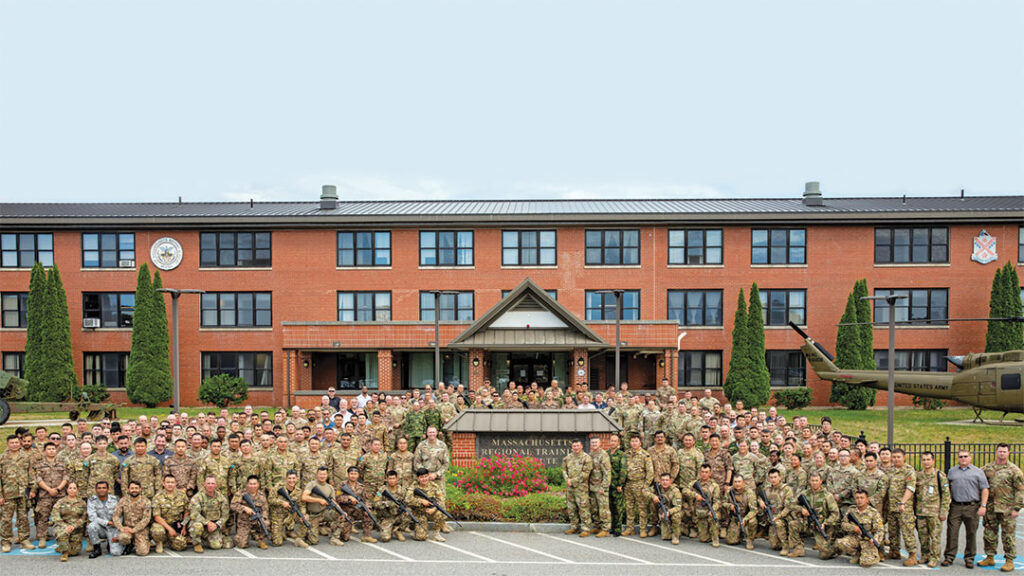As a Task Force Falcon joint patrol maneuvers through the forests of northern Atropia, near the disputed border with its aggressive neighbor Donovia, Soldiers scan the sky for unmanned aerial vehicles (UAVs) and the terrain for hostile ground forces. Intelligence reports indicate that ethnic Donovian insurgents, loyal to the neighboring state and seeking to destabilize the disputed region, lurk among the trees.
Suddenly, an enemy UAV appears above the tree line and the patrol is ambushed by insurgents. The task force Soldiers react rapidly and effectively, maneuvering to neutralize the enemy and its UAV. Though the attack injures three task force Soldiers, their multinational comrades-in-arms staunch the wounds and summon a helicopter for medical evacuation.
The countries of Atropia and Donovia are fictional and the operation part of a field training exercise (FTX) at Regional Cooperation 25 (RC 25), held June 16-27, 2025. The details of the scenario, though devised by United States Central Command (USCENTCOM) and participating nation planners, reflect world events.
Regional Cooperation is a multinational military exercise conducted by USCENTCOM since 2001, in coordination with the U.S. National Guard State Partnership Program. Nearly 300 military service members from eight nations — Kazakhstan, the Kyrgyz Republic, Mongolia, Pakistan, Tajikistan, Turkmenistan (U.N. neutral), Uzbekistan and the United States — participated in RC 25.
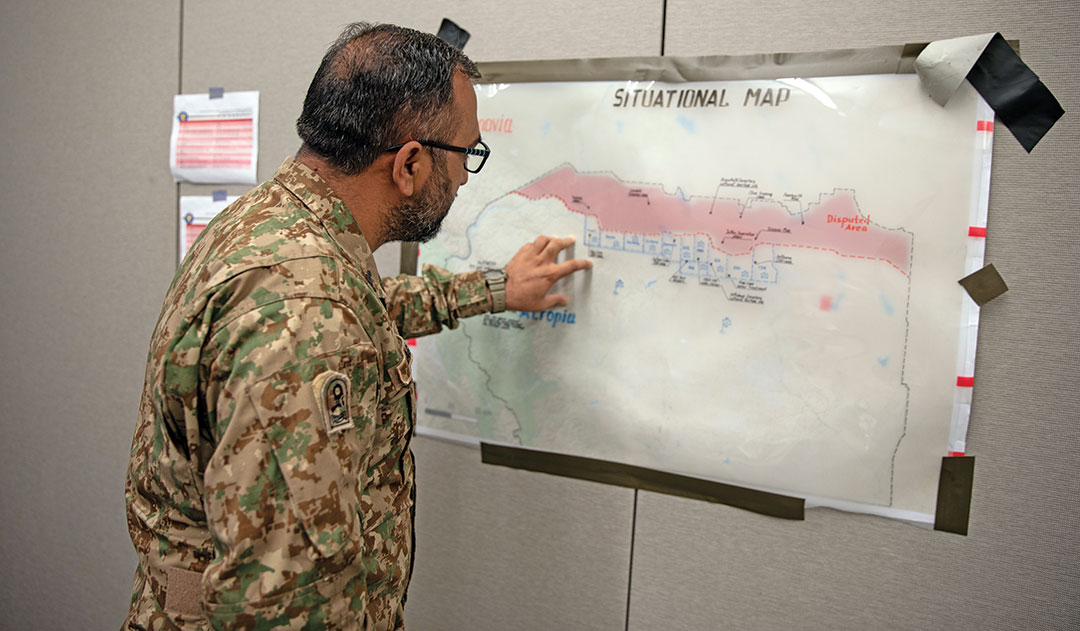
Armenia, Georgia and the United Kingdom sent observers. This year’s exercise was hosted by the Massachusetts National Guard at Camp Edwards on Joint Base Cape Cod. The Arizona National Guard hosted the previous iteration in Phoenix in 2024.
RC 25 focused on stabilization, protection and special operations, in concert with the long-standing Regional Cooperation mission to foster regional security and stability through cooperative partnerships among participating nations.
In the scenario for RC 25, Donovia, a larger and more militarily powerful successor state of the since-collapsed Donovian Federation, has aggressive designs on the natural resource-rich regions of neighboring Atropia, which gained independence from the Donovian Federation decades earlier.
In response to Atropia’s plea for international help, a multinational Combined Joint Task Force is formed under a United Nations Security Council mandate to stabilize northern Atropia, defeat hostile insurgents, protect civilians and critical infrastructure, suppress organized crime and deter the threat of Donovian invasion.
Participants in the RC 25 command post exercise (CPX) — Regional Cooperation’s main event — planned and executed stability operations as a headquarters staff. Multinational officers and noncommissioned officers (NCOs) were assigned to their respective areas of expertise: operations, civil affairs, information operations, intelligence, logistics and special forces. They addressed fictional scenarios meant to test their ability to adapt to and overcome challenges through communication and teamwork.
Brig. Gen. Atif Ejaz, the senior Pakistani officer at RC 25, stressed the mutual benefits of the exercise for participating nations.
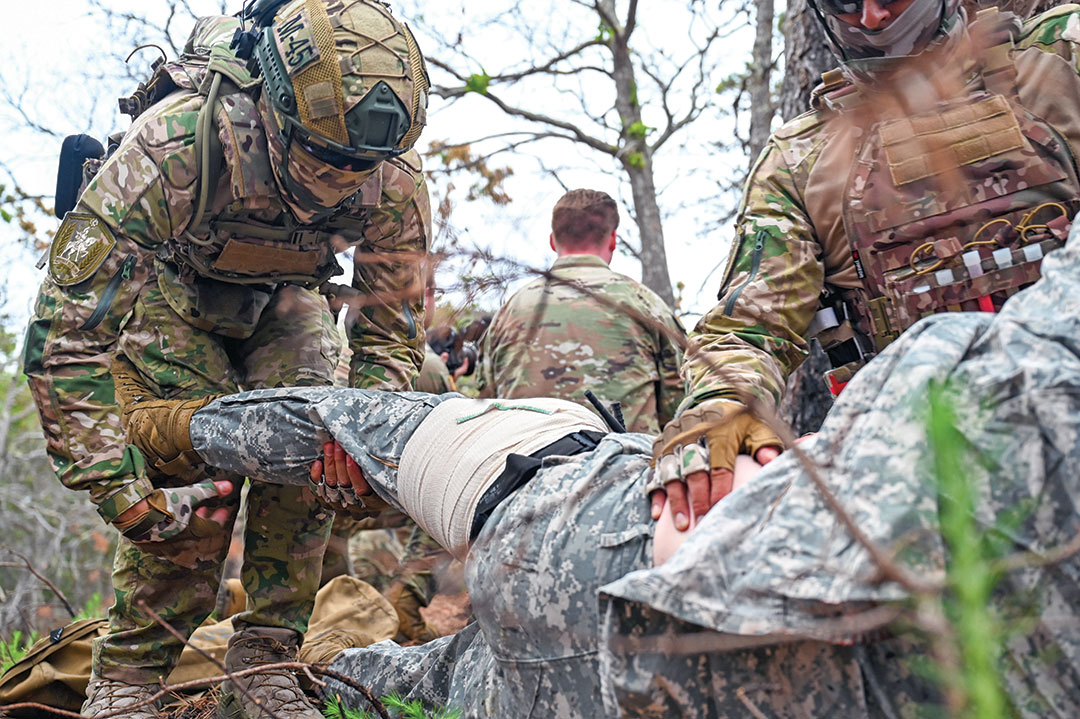
“We all seek to learn from each other because global dynamics are changing so fast,” he said. “Each and every part of the region is concerned with the multidimensional security challenges, and this is a great platform where we can come together and share ideas about how to confront those challenges, not only in the kinetic domain, but in the non-kinetic as well.”
Command Sgt. Maj. Munkhbat Gantumur of Mongolia, the senior ranking NCO at the exercise, emphasized the lasting benefits of the event. Peacekeeping and stabilization missions are nothing new to Mongolian forces: They have served in places like Iraq and Afghanistan, as well as on U.N. peacekeeping missions.
“Since 2010, we have participated in this exercise,” Sgt. Maj. Munkhbat said. “We especially send our staff officers to improve their knowledge, but also to share our own experiences.”
Col. Rustamjon Pulatov, the senior ranking participant from Uzbekistan, agreed that sharing experiences with partners from other nations is critical to the exercise’s success.
“The planning itself, in theory, here is very similar to what we do, but the practical application is different and that’s where the experience is important, and the exchange of experiences,” Col. Pulatov said.
Regional Cooperation typically focuses exclusively on the desk-bound command post exercise, so participants expressed appreciation for the fresh inclusion of the FTX and cybersecurity training.
Col. Muhammed Bobojonzoda, the senior officer from Tajikistan, singled out combat first aid and medical training.
“That kind of training is really saving human lives,” Col. Bobojonzoda said.
Uzbek Soldiers who participated in the field exercise were “very enthusiastic” about the “outstanding” training, Col. Pulatov said.
Brig. Gen. Atif also praised the evolution of Regional Cooperation to include troops in the field.
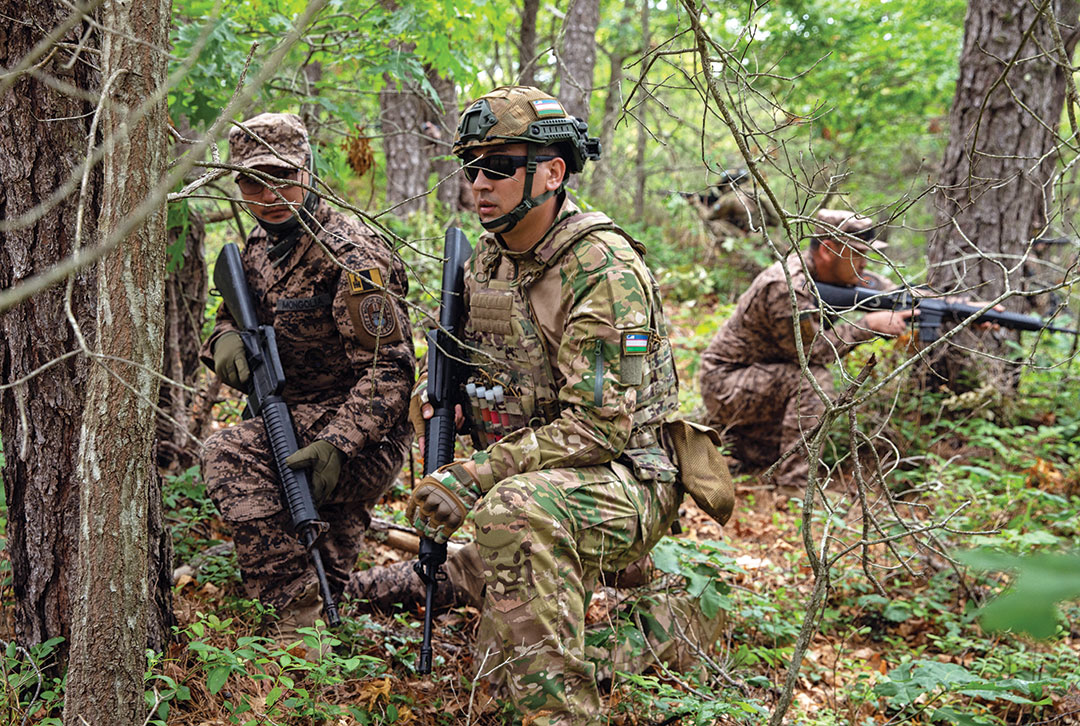
SGT. JAMES VAUGHAN/U.S. ARMY NATIONAL GUARD
“It’s been great. It’s been practical,” he said. “There is so much to learn with the U.S. being the host and the practices they are following because of their involvement all over the world and their multidisciplinary, varied deployment experience.”
In addition to the medical training, the FTX allowed troops to familiarize themselves with U.S. equipment such as UH-60 Black Hawk helicopters, train in urban and rural terrain, and counter the threat of hostile UAVs.
Cyber security training began with four days of classes focused on fundamentals such as cyber threat analysis and the use of cyber threat hunting tools with names such as Security Onion and Elastic Kibana. Once equipped with that knowledge, participants graduated to five days of active training in which they had to defend computer systems against cyberattacks.
As RC 25 approached its conclusion, participants said this year’s events were a resounding success.
Sgt. Maj. Munkhbat, a special forces veteran of combat deployments to Iraq and Afghanistan and U.N. peacekeeping missions to Africa, praised RC 25’s realistic and timely scenarios. He called Regional Cooperation “one of the most effective exercises” for encouraging cooperation among multinational participants.
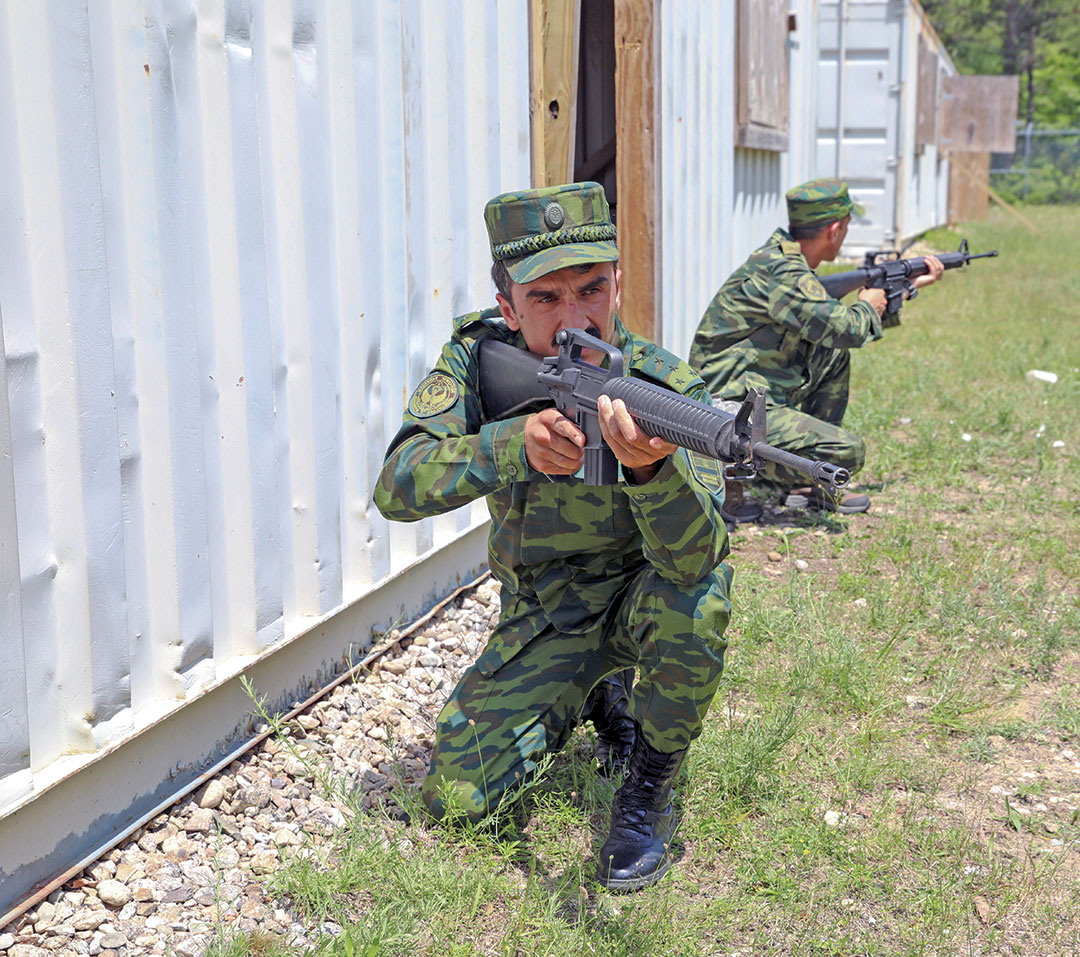
Exercise commander Col. Luis Rodriguez of the Massachusetts National Guard expressed admiration for his Mongolian colleague, Sgt. Maj. Munkhbat. “He’s excellent — really impressive,” the colonel said. “I’d be proud to have him as my sergeant major.”
Col. Pulatov of Uzbekistan thanked USCENTCOM and the Massachusetts National Guard for organizing and hosting RC 25, enthusiastically endorsed the expanded exercise format, and called for more of the same in future iterations.
For several years, Uzbekistan had only been an observer to Regional Cooperation, but “is now becoming a full-fledged partner and participant, including, potentially, hosting this exercise in Uzbekistan in the future,” Col. Pulatov said.
The U.S. National Guard State Partnership program matches state National Guard units with troops from partner nations. The National Guard and partner nations conduct military-to-military exchanges, joint training and other security cooperation with a focus on civil-military coordination. Since it started in 1991, the program has grown to include 115 countries.
Partnerships represented at RC 25 included Kazakhstan with the Arizona National Guard, the Kyrgyz Republic and Turkmenistan with the Montana National Guard, Mongolia with the Alaska National Guard, Tajikistan with the Massachusetts National Guard and Uzbekistan with the Mississippi National Guard.

